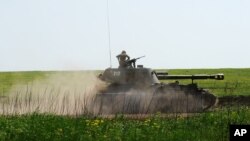Russia this week held surprise, massive military exercises as members of NATO, the western military alliance, took part in its own drills. Military analysts say the military muscle-flexing increases the chances for incidents that could spark a wider conflict.
The drills come as the Reuters news agency reports a Russian military build-up on the border with Ukraine and President Vladimir Putin signs a law making the loss of Russian troops in special operations a state secret.
Russia's military this week held four days of unannounced, large-scale drills involving hundreds of fighter jets, anti-aircraft missiles, and 12,000 troops.
Russia's Defense Ministry called the exercises a “surprise combat readiness inspection” for its air forces. It also held military drills in the central, south, and west of the country as part of preparations for a larger exercise later this year.
Russia's snap drills came as members of NATO, the North Atlantic Treaty Organization, began two weeks of drills in the Arctic with 100 aircraft and 4,000 troops.
Pavel Felgenhauer, a defense analyst and columnist with Novaya Gazeta in Moscow, says the military muscle-flexing will further cause already tense relations between Russia and the West to deteriorate.
“Well, it's not just simply messages - actually preparation for a possible confrontation. And, also it is a message that we're there and ready to take on any and [every] possible enemy," said Felgenhauer.
While the NATO members' exercises were announced months in advance, the Western military alliance has expressed concern about the string of sudden Russian military drills.
Russia's military has been posturing and probing since tensions broke out over the Kremlin's annexation of Ukraine's Crimean peninsula and support for rebels in Ukraine's east.
NATO countries have recorded increased scrambling of fighter jets to intercept Russian ones coming too close to their air space.
“And when one side conducts exercises, another side is monitoring those exercises or having its own exercise - like when the bombers are flying, the interceptor fighters are sent into the air and to get close to bombers," said Alexei Arbatov, head of the Center for International Security at the Russian Academy of Sciences and head of the non-proliferation project at the Moscow Carnegie Center. "This is prone with technical accidents which in the present situation may have very dire political and strategic consequences."
NATO countries also say Russian fighter jets are turning off their transponders, a tactic not seen since the Cold War.
The result, Felgenhauer says, is the risk of a mid-air collision that could spark a more serious conflict.
“Civilian air traffic was maybe 10 times smaller over Europe 30 years ago than it is right now. So, actually, the threat of collision has risen but the mode of operation of the Russian air force has not changed," he said.
The Kremlin argues NATO is aggressively surrounding Russia in violation of a verbal agreement not to expand to eastern Europe. NATO says no such agreement was ever made and some analysts say the Kremlin is using the expansion of NATO as an excuse to ratchet up nationalism for public support.
Putin at one point expressed a desire to possibly join NATO.
As relations soured over Ukraine, Russia's National Security Committee last year rewrote Russia's defense doctrine to identify NATO as the top threat to its security.
Last year, the Kremlin began very loudly touting its nuclear weapons status. Analysts like Arbatov says Russia see the nuclear warning to Western powers as one of its few options.
“My interpretation is that this was a political signal to the West, a message, not to intervene militarily in what was happening in Crimea and what was happening in southeast Ukraine, since Russia considers itself to be inferior in conventional forces," he said.
Arbatov says direct lines of communication between military structures of Russia-NATO and Russia-Brussels, as well as strategic nuclear forces, would help prevent incidents spiraling out of control.
“If there is some sort of accident, the only means and resources are the military liaison group, which resumed its work recently, and also the hotline between Moscow and Washington. However, I don't think this is enough," he said.
Despite Western sanctions over Ukraine and low oil prices causing Russia's economy to stagnate, the Kremlin has been increasing spending on its military at a rate that analysts say will have to slow down.
The military maneuvers come as the Reuters news agency reported Russia's military is building up along Ukraine's border. The report released Wednesday says Russia is massing troops and heavy weaponry at a makeshift base in what could be preparation for a summer offensive.
It said military vehicles had their license plates removed while troops had taken off their insignias, a tactic used by Russian special forces who seized Ukrainian military bases in Crimea.
Putin admitted the troops were Russian after months of denying their actions.
NATO and the West accuse Russia of playing the same game in supplying weapons and troops to the rebels. Despite mounting evidence, including reports of cover-ups in the deaths of Russian troops sent to Ukraine, the Kremlin has denied giving any military aid.
On Thursday, Putin signed a decree making Russian military casualties involved in peacetime “special operations” a state secret. The decree did not elaborate on what constitutes a special operation.




